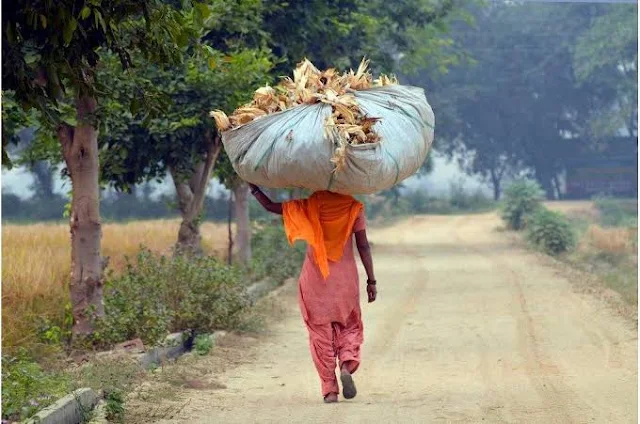Economic consequences of rising temperatures: Decreasing agricultural yields, floods, droughts heavily impacting farmers
Even before the end of March, several parts of India are experiencing a heatwave. On March 16, Odisha recorded a temperature of 43°C, while Jharsuguda touched 42°C. In more than half a dozen locations across the country, temperatures exceeded 40°C. The India Meteorological Department (IMD) has confirmed that such unusual March heatwaves were unprecedented. Notably, 2024 was recorded as the hottest year in human history. March 2023 was the warmest March on record, and March 2024 surpassed that record. Similarly, February 2024 broke the record of the previous February for the highest temperature. Now, indications suggest that March 2025 might follow the same trend.
Scientists warn that at the current rate of global warming, the 1.5°C temperature rise limit, which was initially set to be reached by the end of this century, could be breached as early as 2029. Reports on climate change continue to grow, and these warnings are not mere speculations by activists or pessimists. Instead, they come from the Intergovernmental Panel on Climate Change (IPCC), consisting of the world's leading climatologists. Our glaciers are melting rapidly, and the oceans are heating up four times faster than before. Rising sea levels and an increasing frequency of cyclones are expected to affect coastal regions, while flooding in rivers may intensify.
The impact of global warming is particularly severe on the world's poorest populations, especially women. Food security is at risk, leading to conflicts between nations, forced migration due to climate change, and a rise in zoonotic diseases (diseases that spread from animals to humans).
India’s geographical diversity has been its strength, with the towering Himalayas stretching over 2,500 km in the north and a vast coastline of 7,500 km across nine states. However, coastal states, along with the interior regions, are now facing the increasing threat of cyclones. Over 250 million people in India are directly or indirectly dependent on coastal activities such as tourism, agriculture, and fishing. The western coastline, densely populated with major cities, is witnessing an increase in cyclone frequency and severity due to the warming of the Arabian Sea.
Similarly, rising temperatures are making life difficult in mountainous states like Uttarakhand and Himachal Pradesh, as well as in northern and central states like Rajasthan, Uttar Pradesh, Bihar, and Madhya Pradesh. The economic consequences are significant. The unexpected heat in February destroyed rabi crops, and rising temperatures are affecting industries such as wool production, leading to order cancellations. Last year, on May 28, Churu in Rajasthan recorded temperatures above 50°C, while Delhi experienced over 52°C.
This raises concerns for daily wage workers, rickshaw pullers, and informal sector workers, whose livelihoods are at stake. India’s economy cannot progress without protecting the small and unorganized sectors. The Micro, Small, and Medium Enterprises (MSME) sector alone provides direct and indirect employment to at least 200 million people. With approximately 6 million registered MSMEs contributing 30% to the GDP, any impact on this sector due to rising temperatures could be catastrophic.
In the summer of 2024, India's peak power demand reached 250,000 MW, and the Central Electricity Authority (CEA) estimates that it will rise to 270,000 MW this year. Given that nearly three-fourths of peak demand is met by thermal power plants, India will need to rely heavily on coal-based power generation. IMD attributes this extreme heat to high-pressure conditions over the country, leading to direct and intense solar radiation. The coming days may bring more severe heatwaves.
Food Security at Risk
The harsh climate is also jeopardizing India’s food chain. Decreasing agricultural yields, along with floods and droughts, are heavily impacting farmers. Research on the impact of global warming in India reveals that extreme weather events are affecting different states differently. Areas traditionally known for flooding are now experiencing droughts, and vice versa. Hundreds of districts are witnessing these shifts, directly affecting crop production.
While climate change affects the entire world, densely populated countries like India face a heightened risk of long-term food crises. Additionally, rising sea temperatures and increasing water levels are threatening biodiversity on islands and coastal regions. Mountainous states are also suffering—reduced snowfall is negatively impacting fruit and grain production. In Uttarakhand, Auli, known for winter sports, had to postpone its events due to insufficient snowfall, as the increasing temperature caused early snowmelt.
The frequency of heatwaves in India has been the highest in the past 15 years. Experts predict that this year might break new heat records, necessitating serious attention to emergency healthcare infrastructure.
Moreover, adapting to rising temperatures is crucial. India must rapidly expand its clean energy initiatives, including solar and wind power. An urgent and effective heat action plan is required to mitigate the effects of global warming. Citizens also need awareness about lifestyle adjustments, dietary habits, and public behavior to cope with extreme heat. Hospitals should establish emergency units for treating heatstroke victims.
Without immediate action, the consequences of climate change will become even more severe, affecting health, food security, and economic stability.
---
*Journalist


Comments